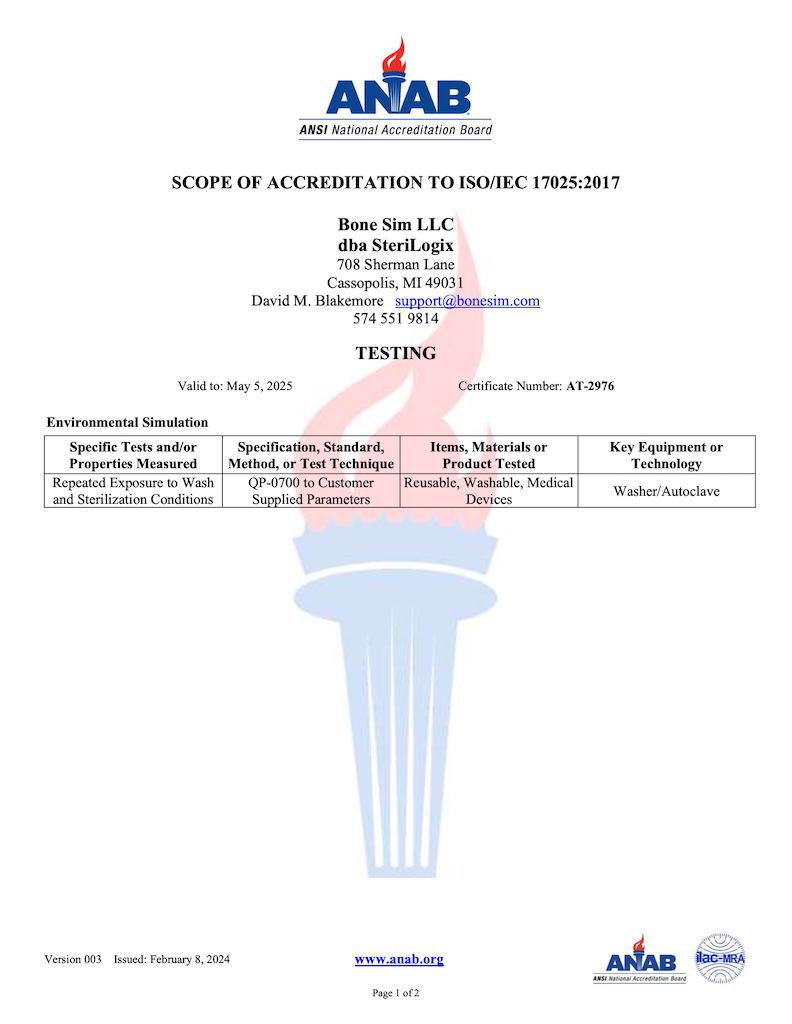The Importance of ISO 17025 Accreditation
Accreditation
Posted by: Jack Jennings
12 months ago

ISO/IEC 17025 is an international standard that specifies the general requirements for the competence of testing and calibration laboratories. It provides a framework for laboratories to demonstrate their ability to produce accurate and reliable results, ensuring the credibility and validity of their testing and calibration activities. SteriLogix is ISO/IEC 17025 accredited to test medical devices for repeated exposure to wash and sterilize conditions.
Here are some of the key reasons we chose to pursue ISO 17025 accreditation:
Ensuring Accurate and Reliable Testing – Medical devices play a crucial role in patient care, diagnosis, and treatment. Any inaccuracies or inconsistencies in device performance can have severe consequences for patient safety and health outcomes. The FDA recently urged manufacturers to be proactive in qualifying third party test labs to avoid fraudulent data in regulatory submissions [1]. ISO 17025 accreditation ensures that testing procedures are standardized, validated, and performed by competent personnel using calibrated equipment. This commitment to accuracy and reliability minimizes the risk of defective devices entering the market, protecting both patients and manufacturers.
Meeting Regulatory Requirements – Regulatory compliance is a significant challenge for medical device manufacturers. Regulatory bodies, such as the U.S. Food and Drug Administration (FDA) and the European Union (EU MDR), require manufacturers to demonstrate the quality and performance of their products through rigorous testing and documentation [2,3]. Increasingly, these agencies are providing guidance on claims related to the useful life of reusable devices. These claims must be backed up with reprocessing durability studies and end-of-life biosafety data. Notified bodies are issuing deficiency notices to manufacturers when there is a lack of this test data to support reprocessing claims. ISO 17025 accreditation provides manufacturers with a credible, independent, and unbiased source for the necessary test data. This can often help facilitate the regulatory approval process and reduce the time and resources required for product certification.
Enhancing Customer Confidence – In the competitive medical device market, building trust and confidence among customers is essential for success. By using ISO 17025 accredited laboratories for all outsourced testing, manufacturers effectively obtain a third-party endorsement of the laboratory’s quality management system and testing capabilities. This can be leveraged to assure customers that the products they purchase meet the highest international standards for accuracy, reliability, and performance. This enhanced credibility can give manufacturers a competitive edge, helping them attract and retain customers in a crowded marketplace.
Continuous Improvement and Innovation – ISO 17025 accreditation promotes a culture of continuous improvement within organizations. By adhering to the standard’s requirements, laboratories are encouraged to regularly review and refine their testing methods, equipment, and processes. This commitment to ongoing improvement fosters innovation, drives efficiency, and enables manufacturers to stay ahead of technological advancements and regulatory changes. Ultimately, this benefits both manufacturers and end-users by ensuring the development of safer, more effective, and cutting-edge medical devices.
As the medical device industry continues to grow and evolve, the importance of ISO 17025 accreditation will only become more pronounced. Manufacturers that prioritize quality, compliance, and customer satisfaction by utilizing SteriLogix for reprocessing durability validations will undoubtedly position themselves for long-term success and leadership in the global marketplace.
[1] FDA Letter to Industry: Fraudulent and Unreliable Laboratory Testing Data in Premarket Submissions. February 20, 2024
[2] FDA Guidance Document on Reprocessing Medical Devices in Health Care Settings: Sec L, 2015 (revised 2017)
[3] European Union Medical Device Regulation 2017/745
Categories:
Ready to Verify the Life Cycle of Your Reusable Medical Device?
Utilizing our Clinical Reprocessing Cycles (CRC) testing provides a technical, non biased, certified validation so that you can be confident your materials and products are able to withstand the rigors of reprocessing.

